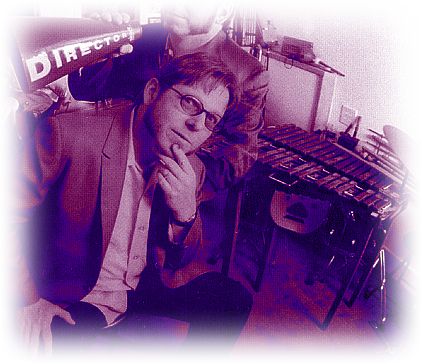
Ralph Carney: Collector of Sounds
by Mark Wasserman
The first time I heard Ralph Carney I was sitting in a tiny theater in Phoenix, Arizona watching the worst production I had ever seen. The play, whose title I've long forgotten, managed to be both violent and dull--not an easy feat to pull off. But at some point, one character turned to the other and asked, "Do we have time for a little 'Temptation'?" And with that the theater's crackly speakers began pouring out a saxophone overture so strange and outrageously operatic that I immediately sat up in my seat.
The song, "Temptation," was by Tom Waits. But the sax work belonged to Ralph Carney, who is to music, what Jim Carrey is to comedy: mind bendingly wacky, unpredictable and ingenious. Largely self-taught, Carney feels most comfortable on sax and clarinet, but he has also mastered the flute, pan-pipes, jaw-harp, trombone and harmonica, as well as non wind instruments such as the piano, cello, guitar and musical saw. Why so many? "I guess I get bored easily," says Carney, scratching one of his lamb chop sideburns. "I'm sort of a collector of sounds."
That eclecticism comes through loud and clear in Carney's music, which seems to sample everyone from early twenties jazz figures like Fletcher Henderson all the way through Ornette Coleman, to more avant-garde artists like Captain Beefheart. Carney also admits the influence of "real atrocious stuff: bad demo records and sound poems, the kind where you send in the lyrics and someone else puts music to `em." At times Carney's own music sounds like some kind of postmodern Salvation Army band playing its ragtag way through the most mad-mournful popular music of the twentieth century.
Perhaps it was this fixation on the unrefined and the unexpected that drew the attention of Waits, whose film noirish trilogy of albums--Rain Dogs, Swordfishtrombones and Frank's Wild Years --explores the mind of a shell-shocked soldier just home from the war. Certainly Carney's contribution--"mostly horn parts askew, semi-out-of-tune"--helped evoke the sonic sensation of a deluded man undergoing a nervous breakdown.
Waits isn't the only one to recognize the often thrilling theatricality in Carney's work. Several independent filmmakers have chosen a few of his songs for incidental music, and Carney recently wrote the score for another one. But while he has enjoyed the exposure, Carney admits that doing commissioned work can also be frustrating. "The thing about film or TV is you have 20 people telling you what to do and asking if you could make it different, so you have to have the temperament for that," says Carney.
Carney prefers working on his own projects, the latest of which is the album, "I Like You (A Lot)." Overflowing with carnivalesque creepiness, it also feels funnier and lighter than his first record, "Ralph Sounds." Carney attributes this transformation to all the difficult changes that the last few years have brought him, including the loss of his mother and sister, a divorce, a re-marriage, and a child. "The first record was more reflective of that turmoil and the second is more about contentment."
Or Carney's version of contentment. "I Like You (A Lot)" leapfrogs so seamlessly from one genre to another that you're forced to simply accept the multi-layered music on its own terms. Whether it's the campy, hipsterish "Fluids," the comically psychedelic "Circling La Guardia," or the homicidally cheerful title song, Carney is having serious fun.
Both records have received favorable, if bewildered response. "I'm not on the cover of Rolling Stone, but the reviews I'm getting are good. You know, 'Wacky Dixieland Clowns on Acid!'" says Carney with a laugh. He is currently working on new songs with a trio and hopes to get into some European festivals. Whether focusing on his own projects or acting as a sideman for others, Carney understands that continuing to work is the important thing. "It's kind of like the Rose Parade, you know?" he muses. "The day after, you have to start working on that next float!"